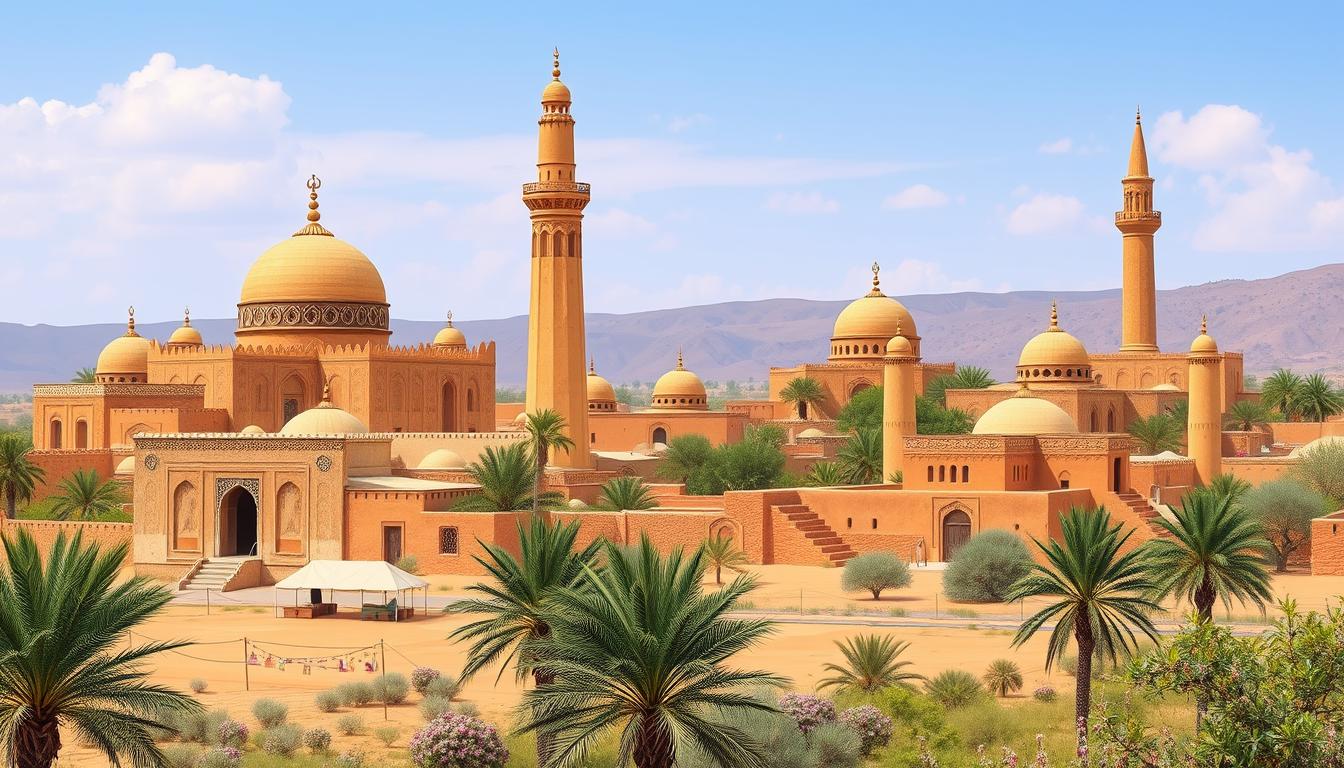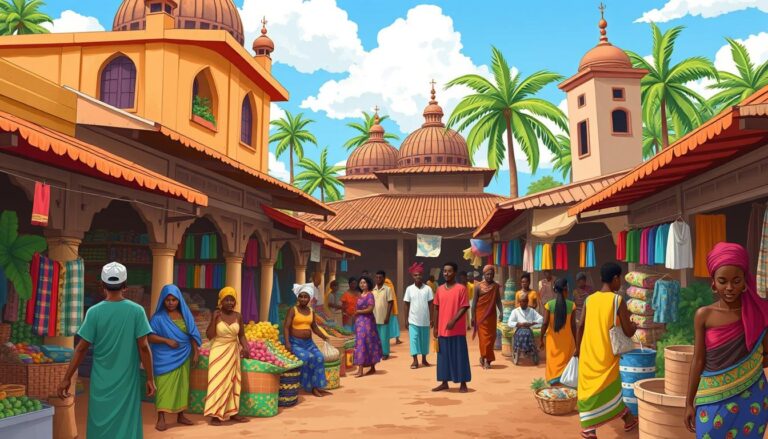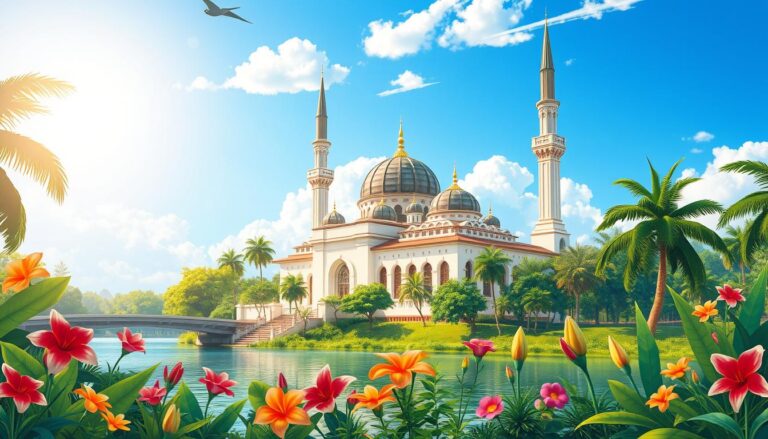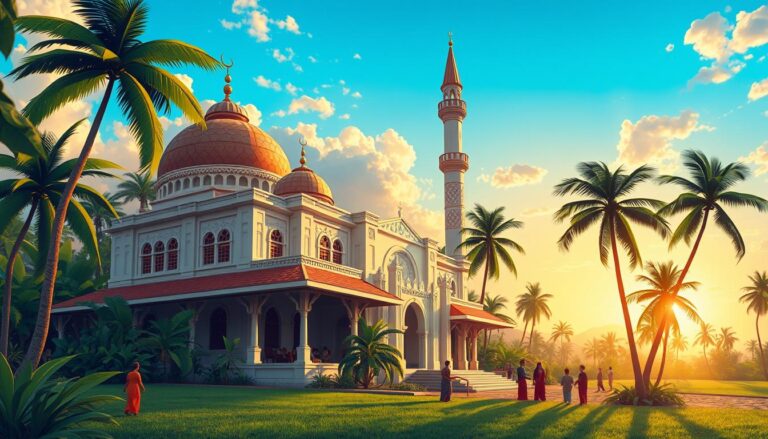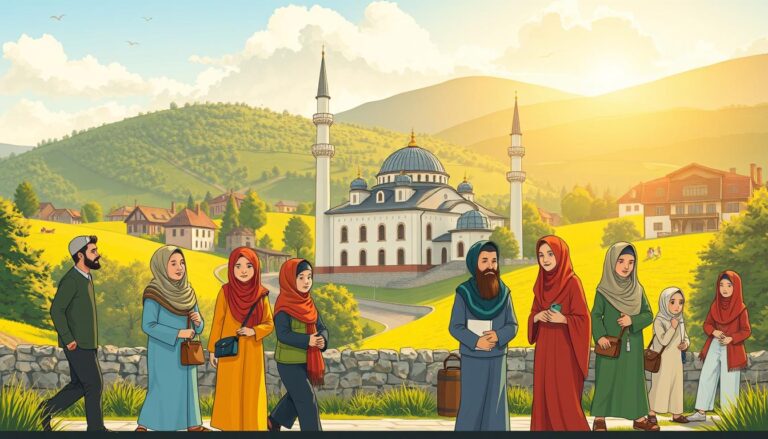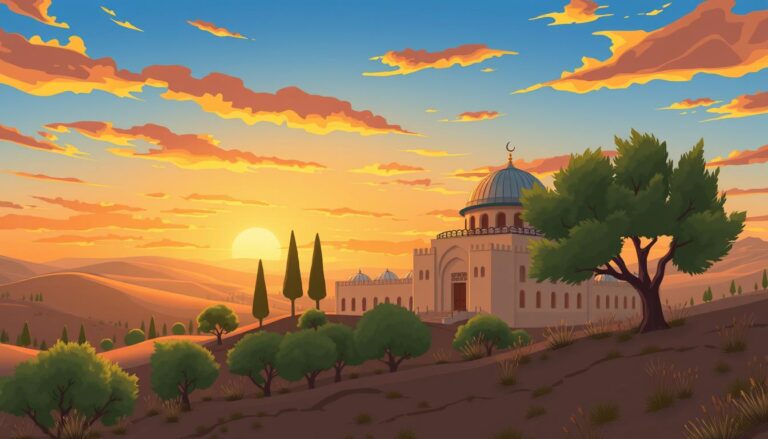Islam in Niger
Islam is the main religion in Niger, with over 99.3% of people following it. Most Muslims, over 95%, are Sunni. Many belong to the Tijaniya Sufi brotherhoods.
Islam has been in the area since the 15th century. It was shaped by the Songhai Empire, trans-Saharan trade, and Sufi orders. Even though Niger has a secular government, Islam is deeply woven into daily life, culture, and traditions.
Introduction
Islam is the main religion in Niger, with over 99.3% of people calling themselves Muslim. This faith has been in the area for over a thousand years. But, it became the main religion in the 19th and 20th centuries.
In Niger, most Muslims follow the Sunni branch, with the Maliki school being the most common. Sufi brotherhoods, like the Tijaniya, also greatly influenced the country’s Islamic heritage.
Significance and Prevalence of Islam in the Country
The spread of Islam in Niger is due to historical events. The Mali Empire (1215-1450) and the Songhay Empire (1430s-1591) helped spread Islam. The Kanem Empire (9th-14th century) and the Almoravid reform movement also played key roles.
Today, the religious demographics in Niger show Islam’s strong presence. It brings Muslims together, especially in areas near northern Nigeria and southern Niger.
“The renewal of Islamic ideas and practices in the region is driven by the mobility of people and objects, with preachers, pilgrims, students, and shopkeepers playing crucial roles as relays of religious transmission.”
Demographics of Islam in Niger
Islam is the main religion in Niger, with over 90% of people following it. Most, about 95%, are Sunni Muslims. The rest, 5%, are Shia Muslims. This shows how Sunni Islam is a big part of Niger.
The Maliki school of jurisprudence is the main Sunni tradition in Niger. Most Muslims follow this. But, there are also smaller groups like Ahmadi Islam and Sufi groups like Hammallism and Sanusiya. They are found in some areas but are not as common as Sunni Muslims.
- Around 95% of Muslims in Niger are Sunni, while 5% are Shia.
- The Maliki school of jurisprudence is the dominant Sunni tradition in the country.
- Ahmadi Islam, Hammallism, and Sanusiya are minority Islamic sects with a limited presence in Niger.
Even though Islam is the main religion, Niger also has Christians and Baha’is. Christians live mostly in cities like Maradi, Dogondoutchi, and Niamey. The Baha’i faith is very rare here.
“The Muslim population in Niger is overwhelmingly Sunni, with around 80% belonging to the Maliki school of jurisprudence. Approximately 7% are Shia, and 6% are Ahmadi Muslims.”
Historical Roots of Islam in Niger
Islam has a long history in Niger, starting in the 15th century. The Songhai Empire’s expansion in the west was a key factor. Trade routes from the Maghreb and Egypt also helped spread Islam.
Spread of Islam through Trade and Empires
The Tuareg people introduced Berber Islamic practices to Niger’s north. In the 18th and 19th centuries, Sufi brotherhoods like the Qadiriyyah and Tijaniya became important. They were linked to the Sokoto Caliphate.
The Songhai Empire, at its peak in the 16th century, helped spread Islam. Muslim scholars, traders, and missionaries moved through the empire. After the empire declined, jihad states emerged, causing political instability.
Influence of Sufi Brotherhoods
Sufi orders, like the Qadiriyyah and Tijaniya, were crucial in the 18th and 19th centuries. They brought unique practices and teachings. The Sokoto Caliphate, linked to the Tijaniya, had a big impact in Niger.
The history of , the , the , and has shaped Islam’s role in the country. It has influenced Niger’s culture and identity for centuries.
Islam in Niger
Practices and Interpretations
In Niger, Islamic practices and interpretations vary widely. This shows the country’s rich religious scene. Most Nigeriens follow Sunni Islam, mainly the Maliki school. But, Sufi orders like Tijaniya and Qadiriyyah also have a big presence.
There’s a range of how people follow Islam in Niger. Some communities mix old traditions with Islamic teachings in a unique way. This mix of old and new shows Niger’s history and people’s ability to blend different cultures and beliefs.
“The practice of Islam in Niger is a tapestry of diverse interpretations, woven with the threads of tradition, mysticism, and cultural integration.”
The Niger government has worked to understand and manage the different religions. They set up the Islamic Forum in 2017 to standardize Islamic practices and stop extremism. They also have a National Worship Strategy to promote peace and freedom of worship.
Even though most Nigeriens are Sunni Muslims, there’s a lot of diversity. Sufi orders and syncretic beliefs add to the richness of Islamic views in Niger. This shows the country’s unique history and people’s ability to mix different cultures and beliefs into their faith.
Sunni Islam: The Dominant Tradition
In Niger, Sunni Islam, especially the Maliki school, is the top choice. About 80% of Muslims in the country follow this school. This tradition has been influenced by Sufi orders and ties with places like the Sokoto Caliphate in Nigeria.
Maliki School of Jurisprudence
The Maliki school focuses on the Prophet Muhammad’s teachings and his companions. It’s big in Niger. This school shapes the country’s religious and cultural life, affecting daily life too.
Its emphasis on practical use and fitting local customs has won many followers. People in Niger like it because it values the Quran, Sunnah, and community agreement, or Ijma’.
Niger’s history with the Sokoto Caliphate also boosts the Maliki school. The Caliphate’s teachings have left a mark on Niger’s Sunni Muslims. This has made the Maliki school even more important.
“The Maliki school’s emphasis on practical application and adaptability to local customs has made it the dominant force in shaping the religious and cultural landscape of Niger.”
Minority Islamic Groups
Sunni Islam is the main form of Islam in Niger. But, the country also has several minority Islamic sects. These groups add to the country’s rich religious diversity.
The Shia Muslims are a notable minority, making up about 7% of Muslims. They are mostly found in the southern parts of Niger.
The Ahmadi Muslims also have a presence, making up around 6% of Muslims. However, they face challenges due to the Sunni majority’s skepticism about their beliefs.
The Hammallism and Sanusiya Sufi sects have a big influence in the west and northeast. These Sufi orders have helped spread and practice Islam in Niger.
“The diversity of Islamic sects in Niger reflects the country’s rich religious heritage, but it has also led to occasional tensions and conflicts between the different groups.”
Even with these minority groups, Sunni Islam is still the dominant force in Niger. The Maliki school of jurisprudence is the most followed.
Government Policies and Islam
The government of Niger is secular. The constitution ensures freedom of religion and separates state and religion. It also acknowledges Islam’s big role in Niger’s people’s lives.
The government has made some Muslim holidays national holidays. It also supports programs like a Muslim radio ministry and the Islamic University of Niger.
Constitutional Provisions
The constitution of Niger protects religious freedom and keeps church and state separate. It bans religious discrimination and lets everyone practice their faith freely. The government follows these rules, allowing everyone to worship without trouble.
Regulation of Religious Organizations
The government in Niger controls where places of worship can be built and who can register religious groups. All groups must register to be legal. They need to submit legal documents to register.
Only registered groups can work in the country. Though some unregistered groups might be in remote areas, the government keeps an eye on religious groups. This is to make sure they follow the law.
The government’s policies on Islam in Niger aim to balance secularism with the religious needs of most citizens. This balance helps keep the country peaceful, even with challenges from extremist groups and political issues.
“The government of Niger has recognized the importance of Islam to the vast majority of its citizens and has taken steps to accommodate their religious needs while upholding the country’s secular principles.”
Interfaith Relations and Tolerance
In Niger, over 98% of people are Muslim. Yet, the country is known for its good relations between Muslims and religious minorities like Christians and Baha’is. Despite some tensions, Niger stands out as a model of peaceful coexistence.
Groups like the Interfaith Dialogue Organization are key in Niger. They work hard to bring different faiths together. Their efforts help build tolerance and open dialogue among diverse religious groups.
Cooperation with Minority Faiths
In Niger, religious groups work together in many ways. For example, the Nigeria Inter-Religious Council (NIREC) has 25 Christians and 25 Muslims. This ensures both faiths have a say and work together.
- In 2019, Abubakar Abdullahi, a Muslim cleric, saved over 250 Christians from Muslim attacks. He received the U.S. Department of State’s International Religious Freedom Award.
- Cardinal John Onaiyekan and Alhaji Muhammad Sa’ad Abubakar III are leaders who promote peace between Christians and Muslims in Nigeria.
- Fr. Chinedu Anieke suggests a national conference on interfaith dialogue. He believes it can strengthen bonds between Christians and Muslims and tackle religious conflicts.
The interfaith relations in Niger are marked by cooperation and respect. This makes Niger a role model for other countries.
“The Catholic Bishops of Maiduguri and Yola have contributed to efforts to rebuild trust and understanding between Christians and Muslims in Nigeria.”
Challenges and Conflicts
Niger has seen challenges from religious extremism and security threats lately. Groups like the “Islamic State in West Africa” and Boko Haram have attacked parts of the country, especially in the Tillabéri Region. The government has cracked down on groups seen as promoting religious intolerance, banning some and jailing their leaders.
These actions have shown how fragile Niger’s religious harmony is. External extremist influences have made things tough.
Extremism and Security Threats
Religious extremism in Niger and security threats to religious groups in Niger have made the country unstable. Militant groups like Boko Haram and ISWAP have attacked both Muslim and Christian communities. This has led to religious conflicts in Niger and forced people to leave their homes.
- Boko Haram, from neighboring Nigeria, has attacked churches and mosques in Niger’s border areas.
- ISWAP, a Boko Haram splinter, has also been active, adding to the security threats to religious groups in Niger.
- The government has banned some extremist groups and jailed their leaders. This shows the balance between keeping religious harmony and fighting religious extremism in Niger.
These issues show the need for a detailed plan to tackle religious conflicts and extremism. Niger also needs to improve its security to protect its diverse religious communities.
“The presence of religious extremism and the resulting security threats have posed significant challenges to Niger’s religious harmony, requiring a nuanced and multifaceted response from the government and civil society.”
Syncretic Beliefs and Traditions
In Niger, Islam has grown slowly. Many communities still hold onto old beliefs within a new Islamic framework. These religious syncretism in Niger practices mix traditional beliefs in Niger and indigenous practices with Islam.
The “holey” cults of the Djerma people show this mix. They blend old animistic beliefs with Islamic rituals. The Bori cult of the Hausa community also combines traditional beliefs in Niger with Islamic elements. This creates a unique religious mix.
“The gradual integration of indigenous beliefs and customs into the broader Islamic tradition in Niger has resulted in a rich tapestry of religious syncretism in Niger.”
Islam is the main religion in Niger, with over 99.3% of the population. Yet, a small group still follows traditional beliefs in Niger or a mix of Islamic and indigenous practices. This shows how the country’s religious scene is adaptable and strong.
The Niger government values Islam but also respects other beliefs. It sees the diversity of religious views, including syncretic beliefs and traditions. This approach helps keep the religious atmosphere peaceful and open in Niger.
Conclusion
Islam is the main religion in Niger, with over 99% of people calling themselves Muslim. The faith’s history in Niger is complex, influenced by trade, empires, and Sufi orders. The government is secular but acknowledges Islam’s importance in people’s lives.
Niger is known for its religious tolerance and cooperation between faiths. The country faces challenges like the Boko Haram insurgency in the Diffa Region. Yet, its tradition of tolerance stands out.
The shared history and culture between Nigeria and Niger are significant. They have a long, open border. This has shaped Islam’s role in the region.
Niger will continue to balance modernity and tradition. Islam’s influence on Nigerien identity and society will be key. The country’s efforts to promote freedom and tolerance are crucial for Islam’s future.
Source Links
- Islam in Niger
- Religion in Niger
- The Spread of Islam in West Africa: Containment, Mixing, and Reform from
- Introduction: Studying Islamic dynamics from a Niger-Nigeria transnational perspective
- National Profiles | World Religion
- Niger – United States Department of State
- No title found
- Islam in Nigeria
- Trade and the Spread of Islam in Africa | Essay | The Metropolitan Museum of Art | Heilbrunn Timeline of Art History
- Joseph Kenny OP: The spread of Islam in Nigeria: a historical survey
- Niger – United States Department of State
- Niger – United States Department of State
- Islam in Nigeria
- Sunni and Shia Muslim and Christian encounters in northern Nigeria | Africa | Cambridge Core
- Niger – Minority Rights Group
- In Niger, Christian and Muslim leaders push harder to counter creeping radicalism
- Niger – United States Department of State
- BTI 2024 Niger Country Report
- Nigeria’s interfaith council fosters peaceful Christian-Muslim relations
- Chapter 6: Interfaith Relations
- 2015 Report on International Religious Freedom – Niger | Refworld
- Conflict in Nigeria Is More Complicated Than “Christians vs. Muslims”
- Violent Extremism in the Sahel | Global Conflict Tracker
- Niger – United States Department of State
- Islam in Niger
- Religious Beliefs In Niger
- Islam, Christianity, Traditional Religions and Power Politics in Northern Nigeria Since Pre-Islamic Period
- Boko Haram along the Nigeria-Niger borderlands: Influences, scope, and management

